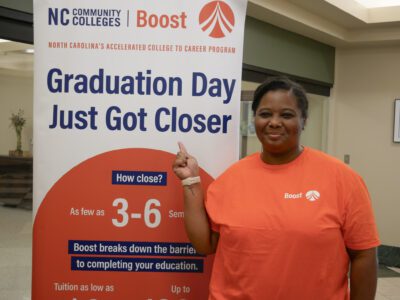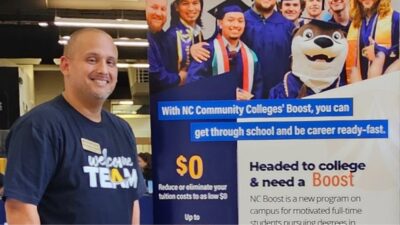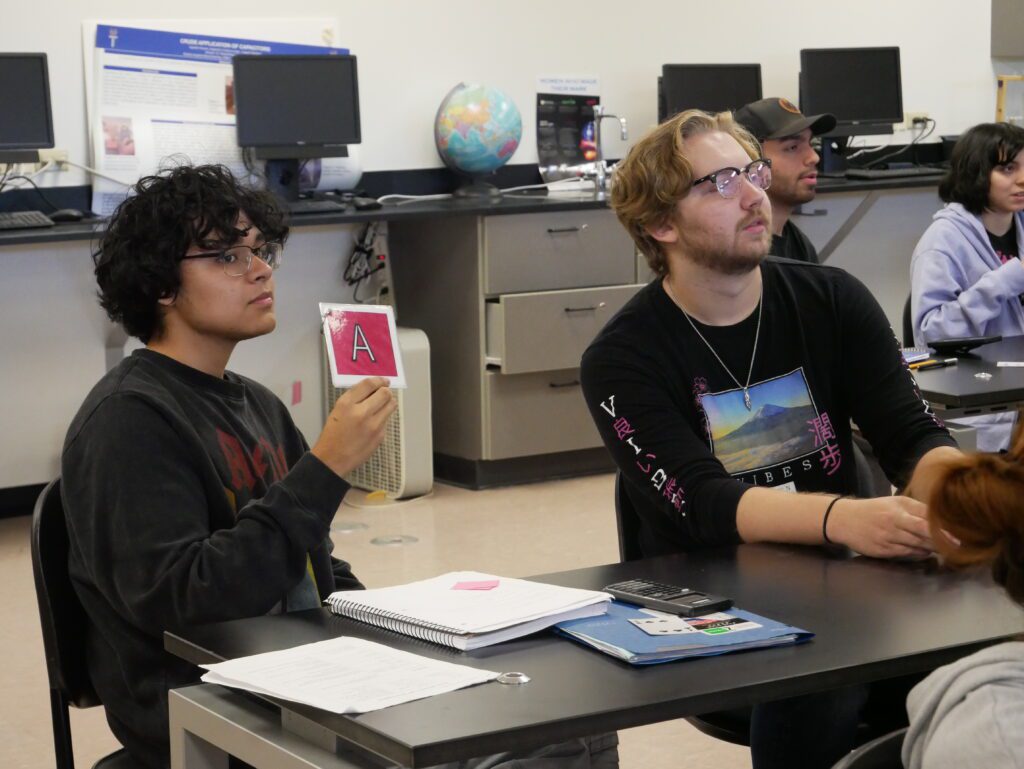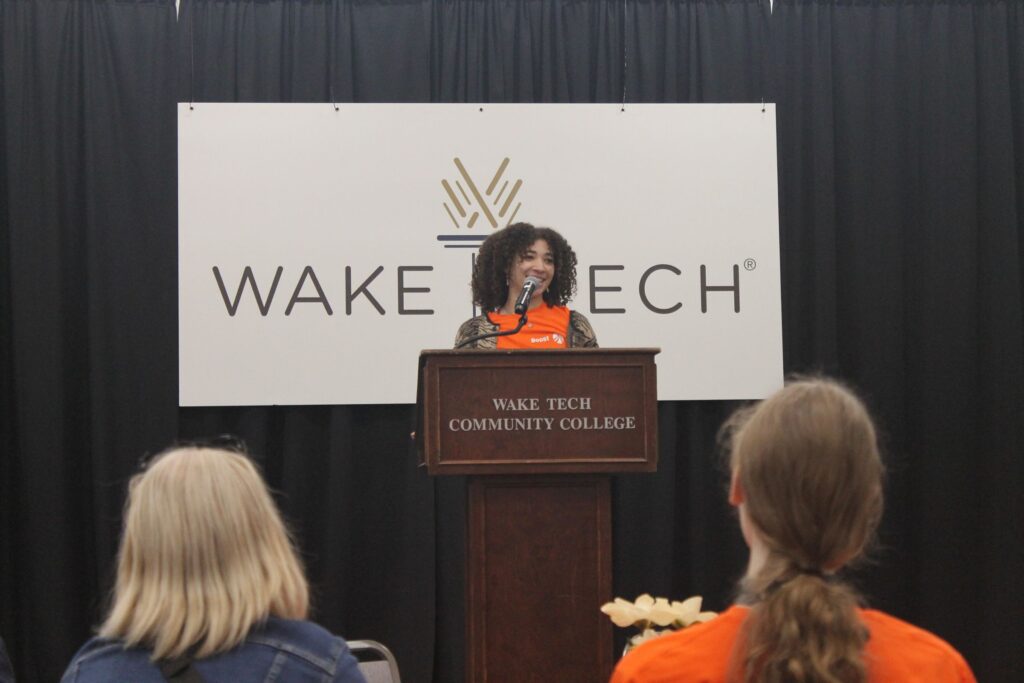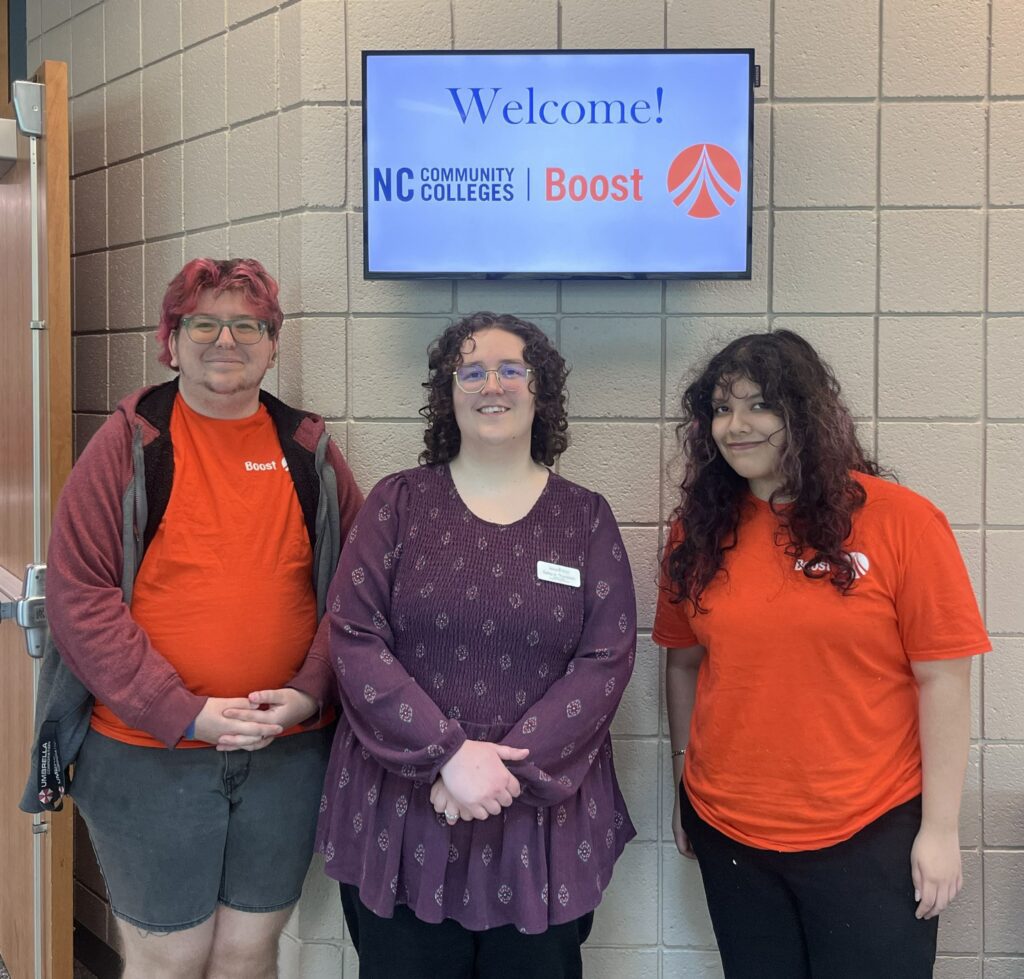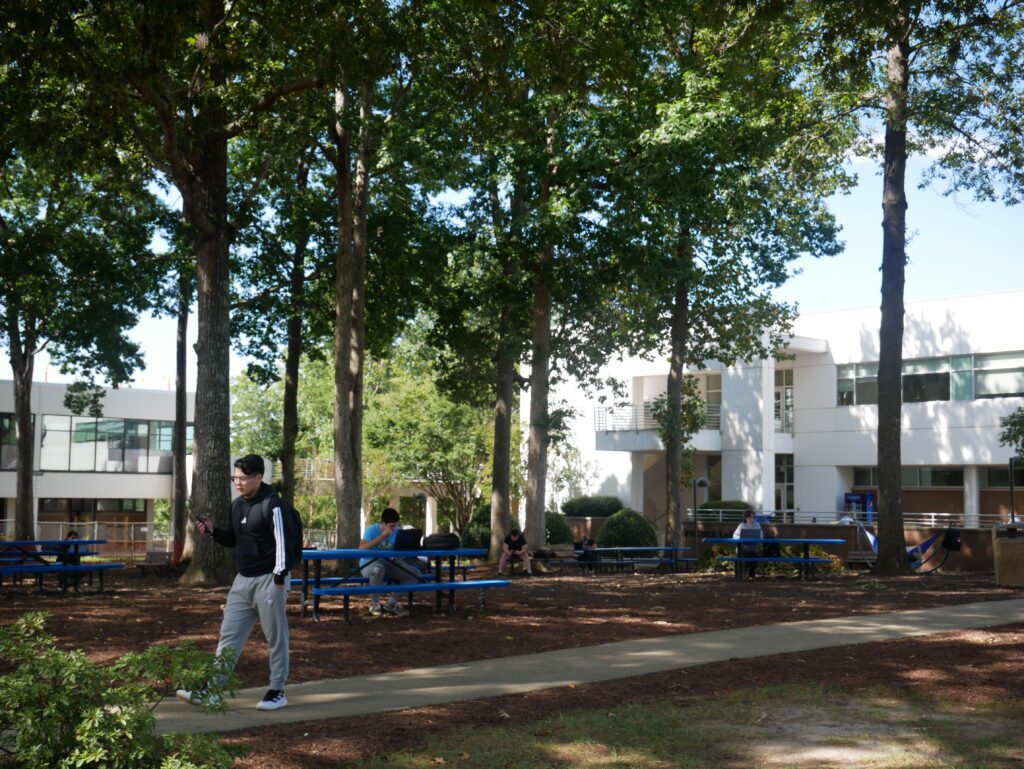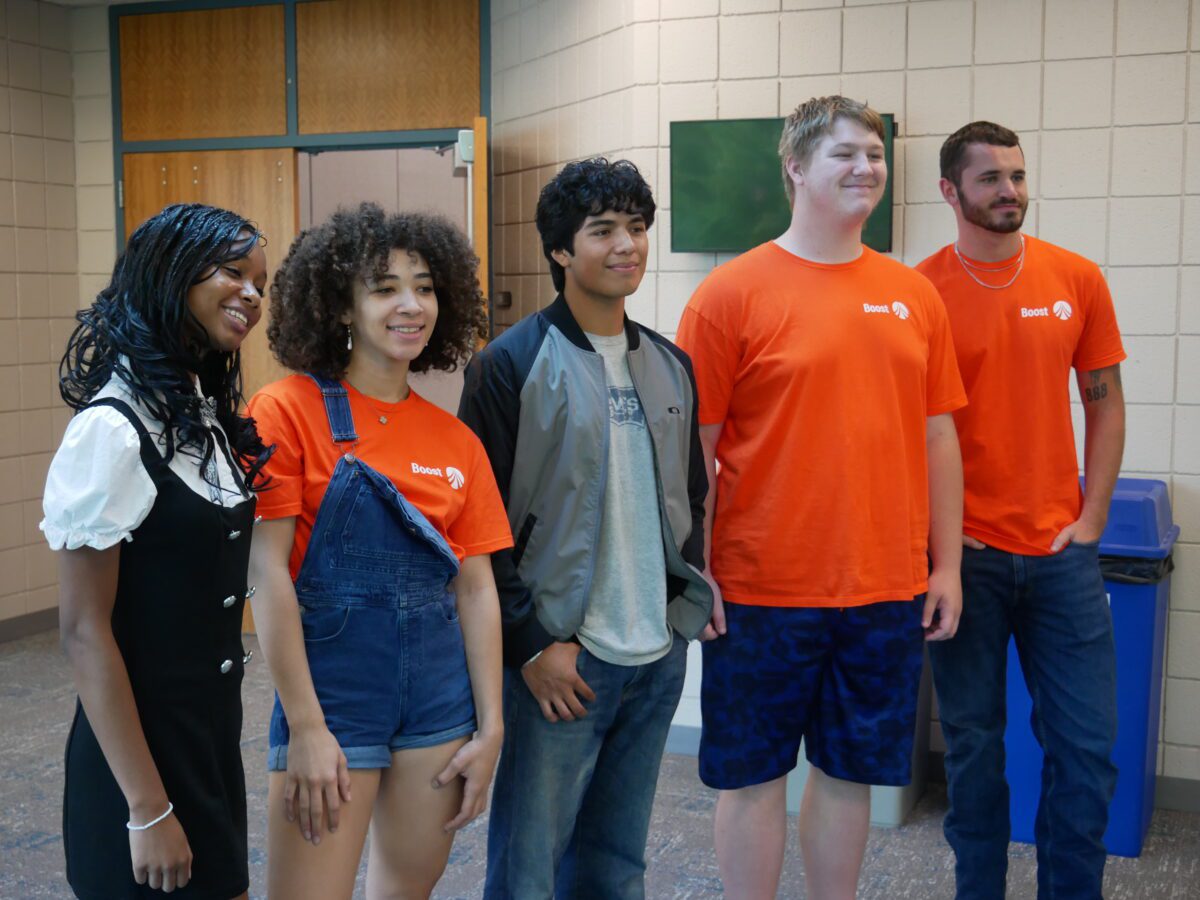
Editor’s Note: EdNC is covering the launch of Boost, North Carolina’s accelerated college-to-career program. This article is part of a series of profiles on each of the eight community colleges in the 2025-26 cohort. You can find all of EdNC’s Boost coverage here.
Clusters of students in bright orange T-shirts stood out in the crowd at Wake Technical Community College (Wake Tech) on Oct. 14 as the college celebrated the launch of the Boost program.
Wake Tech is the state’s largest community college, serving more than 72,000 adults annually. It is also one of the eight community colleges currently implementing Boost, the state’s new accelerated college-to-career program that provides students with wraparound support, including dedicated advisers and financial incentives.
Boost 101
What is Boost? Boost is North Carolina’s accelerated college-to-career program, funded by a grant from Arnold Ventures. It is the first statewide replication of the CUNY ASAP model, a nationally acclaimed and evidence-based program that has proven its ability to increase three-year community college graduation rates. Fifteen N.C. community colleges will implement Boost, beginning with eight colleges in the 2024-25 school year and seven additional colleges in the 2025-26 school year. See the full list of participating colleges here.
Who is eligible? In general, students must receive the Next NC scholarship, have no more than 24 program applicable college credits when they apply, and be enrolled in a degree program aligned with Propel NC, the N.C. Community College System’s proposed funding model that prioritizes “high-wage, high-demand” jobs. Check individual college websites for specific eligibility guidelines.
What support do students receive? Boost students receive frequent interactions with a dedicated Boost adviser, cohort activities with other Boost students, up to $600 per academic year for textbook costs, and a $100 monthly stipend for meeting with their adviser. Tuition and fees are covered by the Next NC scholarship.
The launch event gathered leaders from the N.C. Community College System (NCCCS), Wake Tech staff, and Boost students to celebrate the efforts that made Boost possible. In his remarks, Wake Tech President Scott Ralls thanked Boost students for demonstrating leadership as members of the program’s first cohort.
“A differentiation between leaders and others is leaders go first. Leaders take some risk. They step out in ways. And for each of you, that was a choice that you made,” said Ralls.
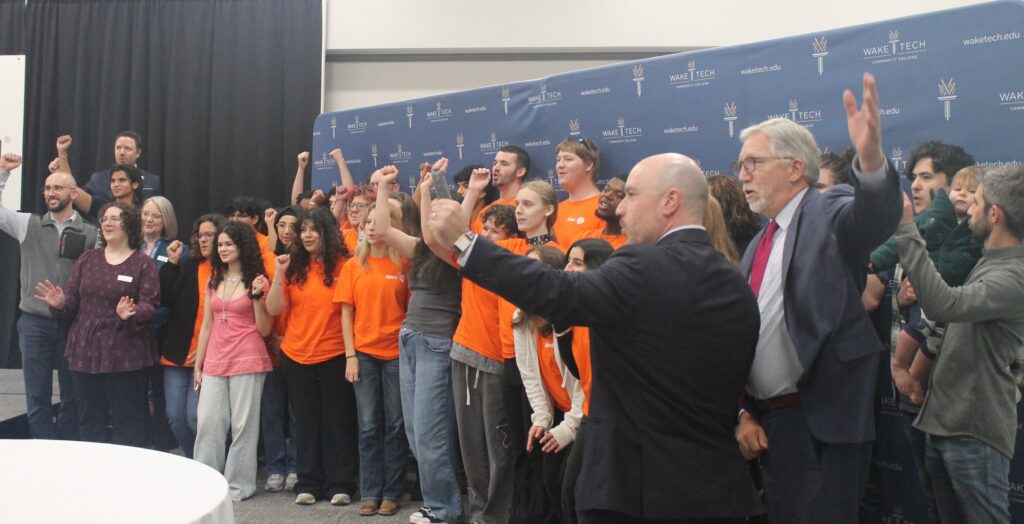
Although Boost is a replication of the CUNY ASAP model, Nicole Ditillo, Boost program director for the NCCCS, said it will take on its own “North Carolina flavor” to meet the unique needs of the state’s students and communities.
Community colleges know their students and their needs best, Ditillo said, adding that she aims to give campuses the flexibility they need to best meet those needs while maintaining fidelity to the CUNY ASAP model.
At Wake Tech, that flexibility includes targeting STEM careers to support economic mobility and workforce development, integrating Boost with existing student support structures, and ensuring the program is scalable and sustainable.
![]() Sign up for Awake58, our newsletter on all things community college.
Sign up for Awake58, our newsletter on all things community college.
Targeting STEM careers to support economic mobility and workforce development
“We’re kind of a paradox economically,” said Ralls, citing two data points. In 2025, Raleigh ranked as the No. 1 city for job opportunities and earning potential, “thanks to a strong tech and biotech presence, proximity to top-tier universities, and consistent population growth.” But in 2024, Raleigh also ranked 41st out of 50 cities in terms of upward economic mobility.
“That creates a lot of cognitive dissonance for us,” he said.
To address that dissonance, the college launched its “Reach and Rally” strategic plan in 2021 with an explicit focus on increasing economic mobility by moving students into jobs with living wages. Now, the college is working to finalize a Reach and Rally 2.0 plan that will continue to support economic mobility and workforce development, and Boost is a key part of that. This is where preparing students for careers in science, technology, engineering, and math (STEM) comes in.
Raleigh currently ranks fifth in the STEMdex, an annual ranking of U.S. metropolitan areas by their potential for future growth in STEM industries, behind cities like Seattle and San Francisco. STEM jobs are also more likely to provide livable wages than non-STEM jobs. According to the U.S. Bureau of Labor Statistics, the median annual wage for STEM occupations is roughly $103,000, compared to $48,000 among non-STEM occupations.
At Wake Tech, supporting economic mobility and workforce development means training the STEM workforce that local employers need. To be eligible for Boost, students must be enrolled in a degree program aligned with Propel NC, the NCCCS’s proposed funding model that “prioritizes connecting students to high-wage, high-demand jobs.” Wake Tech narrowed its Boost eligibility criteria a step further by limiting participation only to students enrolled in the associate in science or associate in engineering degree programs who intend to transfer to a four-year institution and pursue careers in STEM.
Boost fits in right with our goals to help students ladder up to anything they want to be, to claim these opportunities that are in our region. At Wake Tech, we really believe that you shouldn’t just move into our community for opportunities, but you should be able to move up in our community for those very same opportunities. And that’s what Wake Tech’s about, and that’s what Boost is about as well.
— Wake Tech President Scott Ralls
Keyera Redding is one of the students enrolled in Wake Tech’s first Boost cohort. After she graduates from Wake Tech with an associate in science degree, she plans to transfer to Appalachian State University to study biochemistry.
At the launch event, Redding told attendees she was “instantly attracted” to Boost because of its comprehensive and personalized student support services. She also said she values the opportunity Boost gives her to build a community with other Boost students — in her words, her “fellow orange-shirt wearers.”
Ashlyn Wilson, former director of the math and science care team at Wake Tech, said focusing only on STEM degrees will allow students to develop stronger relationships as they move through similar course sequences and transfer processes together.
“Having these students in the same major, in the same cohort, going through the same things, really allows them to be socially intertwined,” she said.
Creating integration and belonging is one of the CUNY ASAP model’s core program components. For Ditillo, seeing students discuss their STEM course schedules and career goals at the launch event is evidence of Boost’s early impacts on students.
“I’m always struck when I come to campuses by seeing the students interacting with one another, and that’s one of the core components of what we are hoping that Boost achieves. It helps students to develop a community and another network of individuals who can be there when they get that first test score back that maybe isn’t what they wanted, or they have a personal challenge in their life,” Ditillo said.
I’m just a firm believer in that community matters, and Boost is about creating a community.
— Nicole Ditillo, NCCCS Boost program director
Integrating Boost with existing student support structures
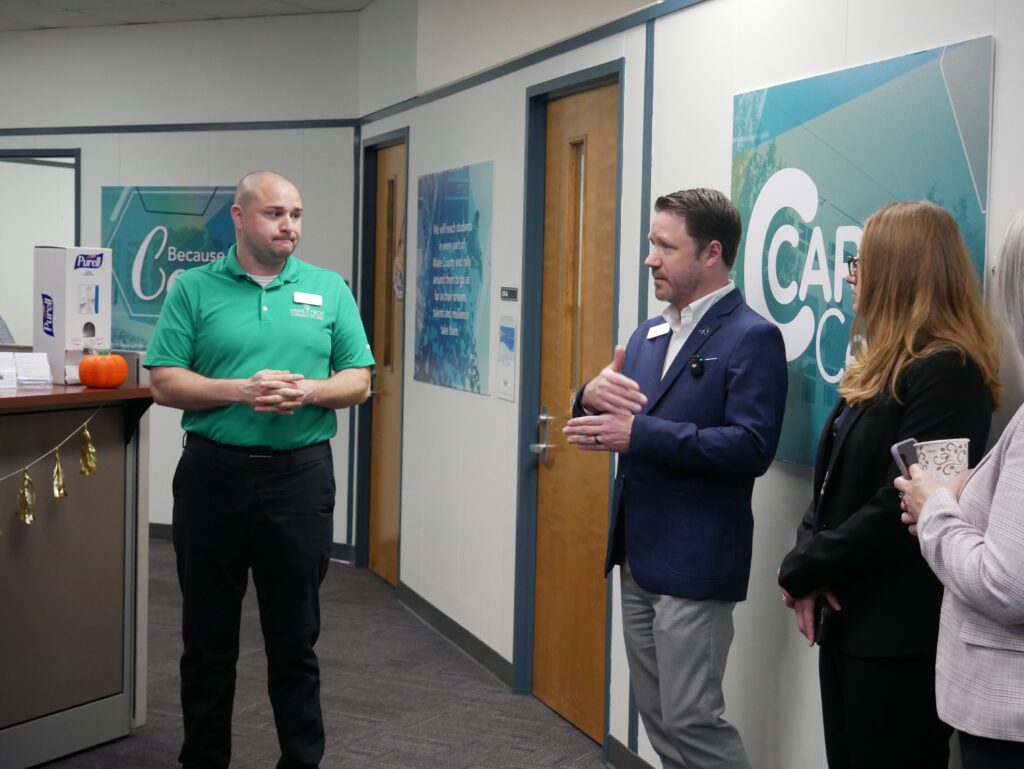
“Five years ago … the way we did advising was more like urgent health care,” said Ralls, noting that, back then, students were matched with advisors as their needs came up.
To address this, a team at Wake Tech proposed a model where every student — regardless of the degree or program they’re enrolled in — would have a dedicated team of people to support them. This idea became what is now called care teams, and Ralls said it has been the most significant organizational change at the college in the last five years.
Each student is assigned a care team that consists of academic advisers and support staff based on their career field, allowing staff to connect students to needed services in an organized way. All Boost students fall within the Math & Science care team but will have a dedicated Boost adviser with a much lower caseload compared to non-Boost students, allowing for more frequent and direct interactions.
“If we had not implemented this five years ago, I don’t think it (Boost) could have had the same possibility,” said Ralls.
Davis Smith, dean of academic advising, said that the idea for care teams grew out of students’ desires to have a “genie” — one person they can turn to when they need help. He said that Boost will complement the existing efforts of the care team and increase the college’s understanding of student outreach and cohort tracking strategies.
We’ve got this system where a student can have that person, that genie, when they walk through the door. But now, (Boost) is going to teach our advisers and our coaches how to go beyond that first step and really follow a student along, and do it in a sustainable, scaled way.
— Davis Smith, dean of academic advising
Scaling and sustaining Boost
Eighty students are currently enrolled in Boost at Wake Tech, and Ralls said he expects the number to reach 150 students, the target cohort size for each Boost community college, by next semester. At a college as big as Wake Tech, that’s only a fraction of the college’s nearly 30,000 degree-seeking students.
Based on how successful other replications of CUNY ASAP have been, Ralls doesn’t worry much about the program’s success. Instead, he says the challenge will be the college’s ability to scale Boost to even more students.
“How do we scale to where many more than 150 students have that kind of ratio to their adviser, and those kinds of financial supports?” said Ralls.
Sustainability is also front of mind for leaders at Wake Tech. Boost is currently funded by a five-year, $35.6 million grant from Arnold Ventures, but colleges assume a portion of the costs of the program beginning in 2027. The grant will cover 90% of funds starting August 2027, 60% of funds starting August 2028, and 30% of funds starting August 2029.
Brian Gann, vice president for enrollment and student services, said the college is already working with its foundation to discuss how to continue funding the program, particularly the direct payments to students. Wake Tech is also pursuing grant funds to expand components of the Boost model, such as smaller student-to-advisor ratios, to additional career areas.
“We’re already thinking five years, seven years down the road right now,” said Gann.
Editor’s note: Arnold Ventures supports the work of EducationNC.
Recommended reading

